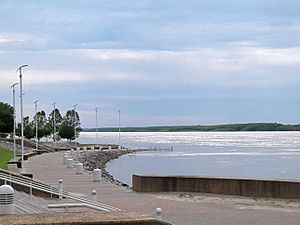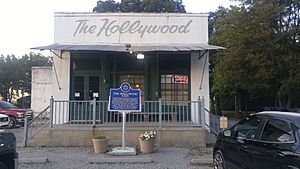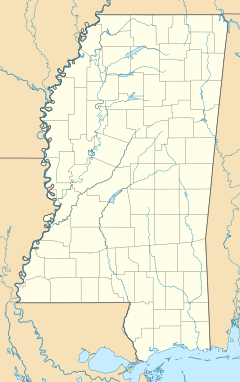Tunica Resorts, Mississippi facts for kids
Quick facts for kids
Tunica Resorts
Robinsonville
|
|
|---|---|

Tunica County River Park
|
|
| Country | United States |
| State | Mississippi |
| County | Tunica |
| Area | |
| • Total | 29.69 sq mi (76.90 km2) |
| • Land | 28.69 sq mi (74.30 km2) |
| • Water | 1.00 sq mi (2.60 km2) |
| Population
(2020)
|
|
| • Total | 2,132 |
| • Density | 74.32/sq mi (28.69/km2) |
| Time zone | UTC-6 (Central (CST)) |
| • Summer (DST) | UTC-5 (CDT) |
| ZIP code |
38664 (Robinsonville)
|
| Area code(s) | 662 |
| FIPS code | 28-74820 |
Tunica Resorts is a special kind of community in northern Tunica County, Mississippi. It used to be called Robinsonville until 2005. This area is mostly found between the Mississippi River and U.S. Route 61, right near the border with Arkansas. In 2020, about 2,132 people lived here.
Tunica Resorts is famous for its six large casino resorts. For a while, it was the third biggest place for gambling money in the United States. Only Las Vegas and Atlantic City, New Jersey made more money from gambling. However, more places now have casinos, including those run by Native American tribes. This means Tunica Resorts faces more competition. The name "Tunica Resorts" was chosen to help tourists find this fun destination more easily. The old community of Robinsonville is part of this larger area. The post office in Robinsonville serves the entire Tunica Resorts area.
Contents
History of Tunica Resorts
In the early 1800s, this area was covered with large cotton farms called plantations. These farms were part of the Mississippi Delta region. They relied on the hard work of enslaved people.
After slavery ended, many African Americans continued to work in farming here. In the early 1900s, many African Americans moved north. This was part of the Great Migration. They left Mississippi for cities like Chicago to find better jobs and escape unfair treatment. The county's population also went down as trains and highways became more popular than river travel.
After 1995, gambling casinos and resorts started to be built in Robinsonville. To follow state laws about riverboat gambling, the casinos are built on platforms that float in the Mississippi River.
Tunica Resorts doesn't have the usual setup of a city or town. It's mostly casinos and cotton fields. Not many people live there all the time.
Tunica Resorts was once the third biggest place for casino gambling in the U.S. It was behind only Las Vegas, Nevada and Atlantic City, New Jersey. Most gamblers come from nearby Memphis. Visitors also come from states like Mississippi, Tennessee, Arkansas, Alabama, Missouri, Georgia, Illinois, and Kentucky. Today, Tunica Resorts is about sixth in gambling money. This is because more states now allow gambling, including on Native American lands.
The 2011 Mississippi River floods caused damage to the casino resorts and other buildings. The casinos themselves float, so they were mostly safe. But the hotel towers and other businesses are on land. Some hotels had a lot of flooding on their lower floors. For example, Harrah's Casino Tunica was under almost six feet of water.
Economy and Businesses

As of 2021, there are six casinos in Tunica Resorts:
- 1st Jackpot Casino Tunica
- Fitz Tunica Casino & Hotel
- Gold Strike Tunica
- Hollywood Casino Tunica
- Horseshoe Casino Tunica
- Sam's Town Hotel and Gambling Hall
At one time, there were eleven different casinos here. Some, like Resorts Casino Tunica and Tunica Roadhouse, have closed. Others, like the Isle of Capri Casino Hotel Tunica, were bought by nearby resorts.
Besides the casinos, there isn't much else built up in the area. You can find a few motels, convenience stores, and fast food restaurants. There's also a shopping center with outlet stores. The oldest business in the community is the Hollywood Cafe, which is a famous blues club.
You'll find some small apartment complexes in Tunica Resorts. Many of these were built after 1990. Casino workers often live in them. Outside of these buildings, the area is mostly flat cotton fields, just like it was before the casinos arrived.
Population Information
| Historical population | |||
|---|---|---|---|
| Census | Pop. | %± | |
| 2010 | 1,910 | — | |
| 2020 | 2,132 | 11.6% | |
| U.S. Decennial Census 2010 2020 |
|||
2020 Census Details
This table shows the different groups of people living in Tunica Resorts. The U.S. Census counts people by their race and also by whether they are Hispanic or Latino.
| Race / Ethnicity (NH = Non-Hispanic) | Pop 2010 | Pop 2020 | % 2010 | % 2020 |
|---|---|---|---|---|
| White alone (NH) | 634 | 407 | 33.19% | 19.09% |
| Black or African American alone (NH) | 1,158 | 1,609 | 60.63% | 75.47% |
| Native American or Alaska Native alone (NH) | 4 | 2 | 0.21% | 0.09% |
| Asian alone (NH) | 31 | 14 | 1.62% | 0.66% |
| Pacific Islander alone (NH) | 4 | 0 | 0.21% | 0.00% |
| Some Other Race alone (NH) | 0 | 29 | 0.00% | 1.36% |
| Mixed Race or Multi-Racial (NH) | 14 | 24 | 0.73% | 1.13% |
| Hispanic or Latino (any race) | 65 | 47 | 3.40% | 2.20% |
| Total | 1,910 | 2,132 | 100.00% | 100.00% |
Arts and Culture
In May 2008, the Mid-South Fair announced it would move to a new spot in Robinsonville. This new location was across from the Tunica Visitors Center. The first fair there was planned for 2009. However, due to bad weather and a tough economy, the fair was held at the DeSoto Civic Center instead. It will stay there until the new fairgrounds are ready.
Education
Children living in Tunica Resorts go to schools in the Tunica County School District. The schools they attend include Robinsonville Elementary School, Tunica Middle School, and Rosa Fort High School.
Local Services
Fire Department
The North Tunica County Fire Protection District protects Robinsonville. This is a fire department with full-time firefighters. It was started in 1997.
Famous People
The blues musician Robert Johnson spent a lot of his childhood here. He lived on a cotton plantation in a place called Polk Place. In the 1920s, he went to a small, one-room church school in Indian Creek.
In Popular Culture
The Hollywood Cafe is a blues club and the oldest business in Tunica Resorts. It is mentioned in the popular 1991 song "Walking in Memphis" by Marc Cohn.
See also
 In Spanish: Tunica Resorts para niños
In Spanish: Tunica Resorts para niños


